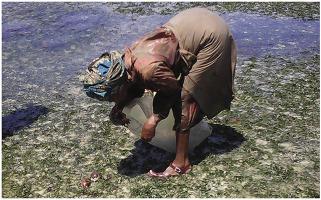当前位置:
X-MOL 学术
›
Ocean Coast Manage.
›
论文详情
Our official English website, www.x-mol.net, welcomes your
feedback! (Note: you will need to create a separate account there.)
Mollusc shell fisheries in coastal Kenya: Local ecological knowledge reveals overfishing
Ocean & Coastal Management ( IF 4.8 ) Pub Date : 2020-09-01 , DOI: 10.1016/j.ocecoaman.2020.105285 Victor Mwakha Alati , Jibril Olunga , Mike Olendo , Lillian Nduku Daudi , Kennedy Osuka , Cyprian Odoli , Paul Tuda , Lina Mtwana Nordlund
Ocean & Coastal Management ( IF 4.8 ) Pub Date : 2020-09-01 , DOI: 10.1016/j.ocecoaman.2020.105285 Victor Mwakha Alati , Jibril Olunga , Mike Olendo , Lillian Nduku Daudi , Kennedy Osuka , Cyprian Odoli , Paul Tuda , Lina Mtwana Nordlund

|
Abstract There is limited documentation on the status and dynamics of fished marine shelled mollusc species in many countries. Some of the challenges are due to obscure documentation of species, extensive unregulated and unrecorded fishing and unawareness of drivers behind declining stocks. The lack of understanding makes it difficult to formulate effective management plans. Here, we assess the fishers’ perceptions on changes in abundance of targeted marine shelled mollusc species and status of associated fished habitats. We interviewed 132 marine shelled mollusc gleaners (fishing by walking) at five sites in coastal Kenya. We established that a multispecies marine shelled mollusc fishery is present in Kenya and that this fishery is conducted by both women and men. We distinguished 158 different shelled mollusc species being targeted. The gleaners perceived a temporal decline of gleaned species. The main causes for the decline were perceived to be overfishing of shells, elevated sea-surface temperature and habitat destruction. The more experienced gleaners perceived a greater decline indicating a baseline shift in perceptions. Our findings suggest that local ecological knowledge is useful to understand historic changes in fisheries lacking long-term scientific data. Furthermore, it highlights the potential benefits of a collaboration between ecologists and gleaners to improve our understanding of the status and dynamics of fishing of marine shelled molluscs as well as other types of fishing.
中文翻译:

肯尼亚沿海的贝类渔业:当地生态知识揭示过度捕捞
摘要 许多国家关于捕捞海洋带壳软体动物物种的现状和动态的文献有限。一些挑战是由于对物种的模糊记录、广泛的不受管制和未记录的捕捞以及对种群下降背后的驱动因素的不了解。缺乏了解导致难以制定有效的管理计划。在这里,我们评估了渔民对目标海洋带壳软体动物物种丰度变化和相关捕捞栖息地状况的看法。我们在肯尼亚沿海的五个地点采访了 132 名海洋带壳软体动物采集者(步行捕鱼)。我们确定肯尼亚存在多物种海洋带壳软体动物渔业,并且该渔业由女性和男性共同经营。我们区分了 158 种不同的有壳软体动物作为目标。采集者察觉到采集到的物种在时间上下降。人们认为贝壳减少的主要原因是过度捕捞贝壳、海面温度升高和栖息地破坏。更有经验的拾荒者认为下降幅度更大,表明认知发生了基线转变。我们的研究结果表明,在缺乏长期科学数据的情况下,当地生态知识有助于了解渔业的历史变化。此外,它还强调了生态学家和捕捞者之间合作的潜在好处,以提高我们对海洋带壳软体动物捕捞以及其他类型捕捞的现状和动态的了解。更有经验的拾荒者认为下降幅度更大,表明认知发生了基线转变。我们的研究结果表明,在缺乏长期科学数据的情况下,当地生态知识有助于了解渔业的历史变化。此外,它还强调了生态学家和捕捞者之间合作的潜在好处,以提高我们对海洋带壳软体动物捕捞以及其他类型捕捞的现状和动态的了解。更有经验的拾荒者认为下降幅度更大,表明认知发生了基线转变。我们的研究结果表明,在缺乏长期科学数据的情况下,当地生态知识有助于了解渔业的历史变化。此外,它还强调了生态学家和捕捞者之间合作的潜在好处,以提高我们对海洋带壳软体动物捕捞以及其他类型捕捞的现状和动态的了解。
更新日期:2020-09-01
中文翻译:

肯尼亚沿海的贝类渔业:当地生态知识揭示过度捕捞
摘要 许多国家关于捕捞海洋带壳软体动物物种的现状和动态的文献有限。一些挑战是由于对物种的模糊记录、广泛的不受管制和未记录的捕捞以及对种群下降背后的驱动因素的不了解。缺乏了解导致难以制定有效的管理计划。在这里,我们评估了渔民对目标海洋带壳软体动物物种丰度变化和相关捕捞栖息地状况的看法。我们在肯尼亚沿海的五个地点采访了 132 名海洋带壳软体动物采集者(步行捕鱼)。我们确定肯尼亚存在多物种海洋带壳软体动物渔业,并且该渔业由女性和男性共同经营。我们区分了 158 种不同的有壳软体动物作为目标。采集者察觉到采集到的物种在时间上下降。人们认为贝壳减少的主要原因是过度捕捞贝壳、海面温度升高和栖息地破坏。更有经验的拾荒者认为下降幅度更大,表明认知发生了基线转变。我们的研究结果表明,在缺乏长期科学数据的情况下,当地生态知识有助于了解渔业的历史变化。此外,它还强调了生态学家和捕捞者之间合作的潜在好处,以提高我们对海洋带壳软体动物捕捞以及其他类型捕捞的现状和动态的了解。更有经验的拾荒者认为下降幅度更大,表明认知发生了基线转变。我们的研究结果表明,在缺乏长期科学数据的情况下,当地生态知识有助于了解渔业的历史变化。此外,它还强调了生态学家和捕捞者之间合作的潜在好处,以提高我们对海洋带壳软体动物捕捞以及其他类型捕捞的现状和动态的了解。更有经验的拾荒者认为下降幅度更大,表明认知发生了基线转变。我们的研究结果表明,在缺乏长期科学数据的情况下,当地生态知识有助于了解渔业的历史变化。此外,它还强调了生态学家和捕捞者之间合作的潜在好处,以提高我们对海洋带壳软体动物捕捞以及其他类型捕捞的现状和动态的了解。











































 京公网安备 11010802027423号
京公网安备 11010802027423号